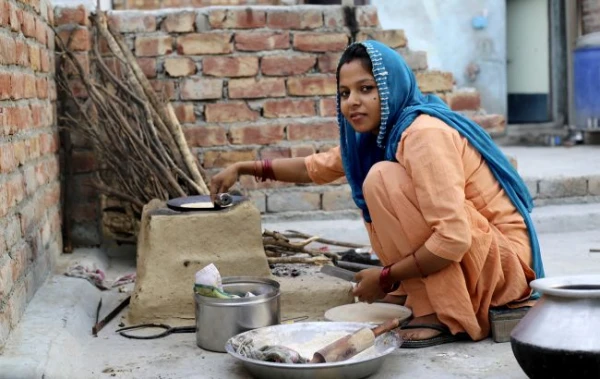
In this vast country, there are its own concepts about everything.
India is a country where the aroma of spices mingles with the noise of the streets, and ancient traditions coexist peacefully with technological progress. But the real India does not begin in palaces or hotels, but in everyday life. It is there that another world opens up - deeply spiritual, simultaneously chaotic and infinitely alive.
Everyday Life Without Embellishments
The lives of most Indians unfold on the streets. Here, people cook, wash, trade, socialize, and even celebrate. In large cities, there is an endless flow of people, rickshaws, cows, and dogs that coexist peacefully on the same road.
The sound of horns never stops, day or night - it is part of the familiar urban noise that locals hardly notice.
Water - A Precious Resource
Water is worth its weight in gold. In many areas, it is supplied for only a few hours a day, so every home has its own storage tanks. Hot water is a luxury, and electricity disappears regularly, especially in the provinces. However, Indians take this calmly: the light will return, just like everything else in this ever-changing world.
Housing Without Familiar Furniture
In many Indian families, there is minimal furniture. People sleep on thin mattresses, sit on the floor, and eat without a table - this is considered a more "pure" and earth-connected way of life.
Eating with Hands - Not a Savage Custom, But an Art
In India, people eat with their right hand - without knives and forks. This is not only a tradition but also a spiritual practice. It is believed that touching food connects a person with its energy, making the act of eating a moment of mindfulness.
The diet mainly consists of rice, lentils, vegetables, chapati bread, and curry. Meat is consumed rarely, and beef is almost never eaten, as cows are sacred. If a cow stands in the middle of the road, traffic simply stops - no one will disturb it.
Tea - The Country's Main Beverage
"Masala chai," a thick drink with spices, is served at every turn. It is consumed several times a day, usually with milk and sugar, which may seem strange to Europeans.
Cleanliness - Not Where We Are Used to
For tourists, India often seems chaotic, even dirty. But here, different notions of cleanliness apply. What matters is not what is outside, but what is inside. A person may walk barefoot in the dust, but before entering a home or temple, they will always take off their shoes, as the inner space must be sacred.
Hygiene also takes on a different form. Most toilets do not have paper - only water and a special scoop. This is considered a significantly cleaner method. Tourists may be surprised at first, but one gets used to everything here. Toilet paper, as we know it, can only be found in wealthy homes and hotels in large cities.
Be Careful in Conversations
In India, it is not customary to refuse directly. A person is more likely to say "yes" than admit they cannot do something. This is related to cultural politeness - a refusal can be seen as an insult. Therefore, tourists often find it difficult to understand when someone is genuinely agreeing to help and when they simply do not want to disappoint.
Another detail is the famous Indian "nodding" head gesture, which can mean everything: "yes," "no," "maybe," or "I hear you." Thus, a traveler will need to learn to read the context.
The Sacred in the Everyday
Religion in India is not a Sunday affair, but a part of daily life. In front of every home, one can see small altars with incense, flowers, and lamps. People greet each other with the word "namaste" - a gesture that means "the divine in me honors the divine in you."
Strict rules apply in temples: one cannot enter wearing shoes, touch sacred objects without permission, or photograph deities. Tourists are advised to observe with respect - religion here lives not in theory, but in every gesture, sound, and scent.
Contrasts That Shape Character
India is a land of contrasts: poverty next to luxury, IT companies next to bamboo huts. But it is this combination that forms the remarkable resilience of the people. Here, it is customary to believe that everything that happens has meaning, and life is a circle where after darkness, dawn always comes.
India is never convenient - but it is always real. It is a country that changes not the route, but the person. Its everyday life is unembellished but full of meaning. And those who can see beauty beyond familiar standards will understand that India is not for photos, but for inner awakening.
Interesting Facts About India:
Men in India rarely consume alcohol - such behavior is displeasing to the gods, and Indians are very religious. Guests in India are treated like royalty, as Indians are very hospitable. This applies to everyone, even to acquaintances. They are given the best seat at the table and served the most delicious dishes.
While eating, Indians use their right hand because the left is considered "unclean."
Trash bins are only found in large cities, while in all others, waste is simply burned. This is why smoke accompanies almost everywhere in India.
Women’s hygiene products in India are considered a luxury item, so most women do not purchase or use them. A woman during such days is considered "unclean," so she may be moved to a separate room. Additionally, women try not to go out - even girls do not attend school.
In India, it is not customary to greet with hugs or handshakes - this is how they maintain their own cleanliness. When greeting, palms are joined, and they say: "Namaste." To older relatives and parents, one must bow low.
In India, birthdays are not celebrated, and people do not count their years. Celebrations only occur during childhood, and afterward, it does not matter.
In some regions of India, it is not customary to lock doors during the day - this is a sign of hospitality and openness.
Masala chai is consumed even in the heat - it is believed that a hot drink helps cool the body.
Indians avoid wearing black clothing during festivals - it symbolizes misfortune.
In many families, three generations still live under one roof, and decisions are made by the eldest family member. In India, it is considered normal for children, teenagers, or young people to sleep in the same bed with their parents.
On the streets of India, one can find barbers, dentists, and even doctors working outdoors - this is common practice in small towns.














Leave a comment